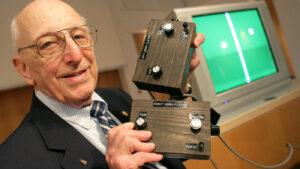
In honor of Jewish American Heritage Month, we continue to recognize the economic, cultural, political, and social contributions of notable immigrants and refugees who’ve helped shape America’s vibrant tapestry. Today, we highlight German American inventor and engineer, Ralph Henry Baer.
Ralph Baer was born in March 1922 to a Jewish family in Germany. Due to anti-Jewish legislation, he was expelled from school, prompting his family to flee. In 1938, just before the outbreak of World War II, they immigrated to New York City. Two months before Kristallnacht (The Night of Broken Glass), Baer became a naturalized U.S. citizen.
In 1940, Baer graduated from the National Radio Institute as a radio service technician. He was drafted into World War II in 1943, serving in the intelligence department. After the war, he earned a Bachelor of Science in Television Engineering from the American Television Institute of Technology in Chicago.
Baer went to work for various technology companies, including Wappler, Inc., Loral Electronics, and Transitron, Inc. In 1956, he joined Sanders Associates, where he conceived the idea for a home video game console, which led to the development of the Magnavox Odyssey, Simon (an electronic memory game), TV game units like the Brown Box, and patents for LED technology.
The Magnavox Odyssey was Baer’s most significant achievement. Released in 1972, it sparked some of the most memorable games, like Pong and Simon Says. Although its technology was basic, featuring no sound, limited visuals, and gameplay reliant on-screen overlays and external accessories, the console introduced groundbreaking concepts such as game cartridges and light gun peripherals. The Odyssey’s release marked the birth of the home gaming industry and helped ignite the video game revolution.
Baer received numerous accolades for his contributions. In 2006, he was awarded the National Medal of Technology by President George W. Bush. In 2010, he was inducted into the National Inventors Hall of Fame, and in 2014, his workshop was moved to the Smithsonian National Museum of American History.
Ralph Baer passed away on December 6, 2014, leaving a remarkable legacy of innovation and imagination.
Others we are celebrating in honor of Jewish American Heritage Month:
2025
Emile Berliner, German American inventor and engineer
Emma Goldman, Russian American, pioneer for women’s rights
Irving Berlin, German American inventor and engineer
Peter Lorre, prolific Russian American composer

